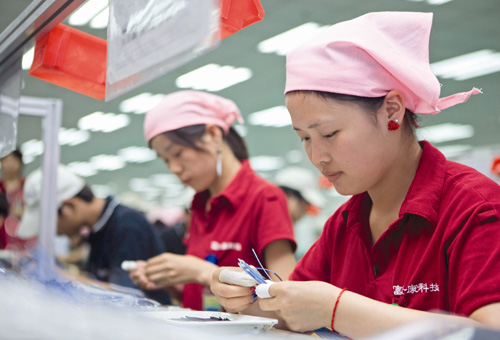Henan on electronics map
By Zhao Yanrong and Shi Baoyin (China Daily) Updated: 2012-08-11 09:40
|
 |
|
Workers at Foxconn's assembly line in Zhengzhou. Many electronics companies have followed Foxconn and set up operations in the capital of Henan province. [Photo/China Daily] |
Foxconn, logistics hub investments give Zhengzhou high-tech edge
When Tim Cook, CEO of Apple Inc, made a surprise visit to the Foxconn assembly line in Zhengzhou earlier this year, little did he know that his visit would push the city in Central China's Henan province on the global center stage as an important destination for electronics manufacturing. Like Cook's visit, which has been deemed "a break from the past", Zhengzhou, home to the first dynasty in China - the Xia Dynasty (21st century-16th century BC) - and a major grain production center and transport hub, is writing a new chapter in history.
The city is marketing itself as the destination of choice for high-tech precision manufacturers of electronics products such as smartphones and tablet computers.
Although Henan is the most populous province in China, with more than 105 million people, it has never been known for its manufacturing prowess until now. However, during the first six months of this year, Henan had a growth rates of 91.6 percent, compared with about 8 percent for the whole of China.
Looking at the remarkable growth, some observers say it likely results from the large supply of labor or the low manufacturing costs. A closer look, though, reveals that the actual impetus stems from large investments made by Foxconn, the contract-manufacturing arm of the Taiwan-based conglomerate Hon Hai Precision Industry Co Ltd.
Foxconn, which undertakes contract manufacturing of the iPhones and iPads for Apple Inc, was the source of more than 48 percent of the city's foreign trade of $10.43 billion during the first six months.
"Foxconn's decision to invest in inland regions such as Zhengzhou was in line with the government's plan to stimulate the economy in Central China. Foxconn and the local government decided to work together for the overall development of the region," said Liu Kun, spokesman for Foxconn Technology Group.
In June 2010, Foxconn decided to house its main iPhone manufacturing unit in Zhengzhou. Futaihua Precision Electronics (Zhengzhou) Co Ltd, a Foxconn subsidiary, owns the $100-million operation.
Production at the new operation began in July 2011 and more than 200,000 iPhones are now made in the region a day.
More importantly, the company has employed about 120,000 workers, mostly locals, until March this year, from the time the project was conceptualized. The numbers are expected to increase further in line with expansion plans, according to company officials.
Statistics provided by Zhengzhou Customs show the value of foreign trade in Henan is expected to nearly double to $60 billion this year, compared with $32.6 billion in 2011. Foxconn's share in the pie is expected to reach $40 billion.
Local government officials are confident that other big companies will also look to set up manufacturing operations in the city. "It is not only Foxconn that is keen on Zhengzhou. Other multinational companies have also expressed interest," said Xue Yunwei, the deputy mayor of Zhengzhou who is in charge of the overall economic development of the city.
"Zhengzhou is one of the best destinations for investment, as it has an educated population and excellent living standards. The infrastructure is also well geared to handle possible future development," Xue said.
The 105 million people in Henan province and the more than 500 million people living within a range of 500 kilometers makes it a huge labor market that is "one of a kind", Xue said.
Zhengzhou also boasts abundant educated workers as it is home to 40 colleges and 200 professional educational institutions. These institutions churn out nearly 600,000 professionals on average every year .
"For further development of the local economy, we definitely need to transfer our industrial base from an energy-intensive one to one that is spearheaded by high-tech manufacturing. Foxconn has been more than adequate for our development requirements," he says.
In the two years since Foxconn set up its manufacturing facility, more than 100 related companies have moved to Zhengzhou. Most of them are Apple's material suppliers, packing companies, or factories that provide components for Foxconn.
"Foxconn is just a start. We will invite the whole industrial chain to Zhengzhou, and transform Zhengzhou into one of the largest smartphone manufacturing bases in the world," Xue said.
Foxconn, based in Shenzhen, Guangdong province, has mostly expanded in developed coastal regions. However, the limitations of such an expansion become obvious to the company two years ago.
"In Shenzhen, we have more than 500,000 assembly line workers staying in our two plants within 5 square kilometers. The high population density generated many issues among young workers, and limited the development of our company," said Liu.
In 2010, Foxconn witnessed a spate of 12 suicides within a short span of time in Shenzhen, where young workers suffered from the high living cost and a crowded working environment.
"When we realized the limitations, we decided to look for more suitable places for factory expansion, and Zhengzhou seemed a perfect choice," he said.
Though most coastal cities are facing severe labor shortages, Foxconn is not very worried as it has an abundant labor pool in Zhengzhou. Nearly 90 percent of the migrant workers in Foxconn's Zhengzhou plant are from Henan province.
"It took us only one month to renovate the workshops and the workers' dormitories and to install the operations in Zhengzhou," says Lin Zhenghui, deputy general manager of Foxconn. "Such kind of progress for a big manufacturer like Foxconn is very rare."
Like many others, Ma Fangfang, a 22-year-old employee from Zhoukou in Henan province, is satisfied that she is working in a modern manufacturing facility in her home province.
Ma was earlier employed at an electronics factory in Zhejiang province. But after three years of working at different factories, Ma feels happy to work at Foxconn's Zhengzhou unit.
"Zhengzhou is just a three-hour train ride from my hometown of Zhoukou and the workplace it (Foxconn) provides are excellent," she says. "The remuneration package is good and on par with what I was earning in Zhejiang. My costs are lower as the living cost here is much lower than in Zhejiang. It also gives me adequate opportunities to visit my parents," Ma says.
Apart from manufacturing, Foxconn is also looking to house its sales and research centers in Zhengzhou to help the city move up the value chain, Lin from Foxconn's Zhengzhou unit said in a interview with Xinhua News Agency.
Foxconn's Zhengzhou plant is in the Zhengzhou Xinzheng Free Trade Zone, as well as the Zhengzhou Airport District. The new plant occupies about 2 sq km of the district's total area of about 5 sq km. Having such a big area, the working population in the unit is expected to surpass 150,000 by the end of the year and to exceed 300,000 in the future. Eventually the unit will become the largest plant for Foxconn in China.
"We have been able to implement several new policies here that were aimed at worker welfare, such as the plan to have houses for Foxconn workers," Liu says. In Shenzhen, the working and living environment for employees has come under intense scrutiny due to a large number of employees and a limited residential area.
According to Liu, no apartments are offered to new workers in Shenzhen, even though they are a part of the benefits under Foxconn's employment policy.
"In the new Zhengzhou campus, we are able to offer much better accommodation to our workers and technology experts, which makes the opportunities at Foxconn even more attractive."
Contact the writers through zhaoyanrong@chinadaily.com.cn
- China economy stabilizing, additional policy support possible: report
- Chinese car firms gain greater overseas foothold
- E-Class L heralds new decade of development for joint venture
- Both patents in copycat suit canceled
- China and Germany expand NEV cooperation
- Passenger car sales exceed expectations
- Global investors ride out MSCI snub
- Large shareholders selling spree spooks retail investors


















